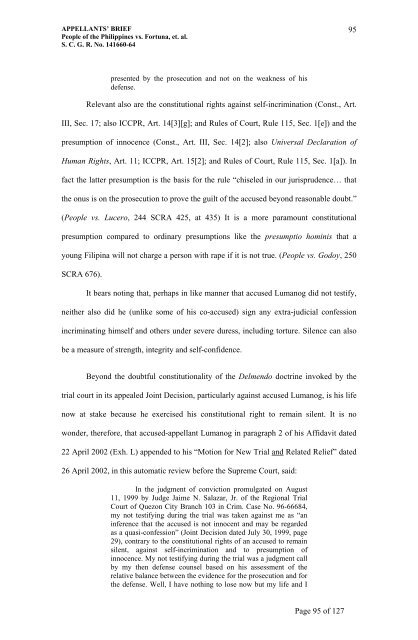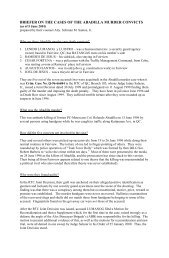Republic of the Philippines - Campaign
Republic of the Philippines - Campaign
Republic of the Philippines - Campaign
You also want an ePaper? Increase the reach of your titles
YUMPU automatically turns print PDFs into web optimized ePapers that Google loves.
APPELLANTS’ BRIEF<br />
People <strong>of</strong> <strong>the</strong> <strong>Philippines</strong> vs. Fortuna, et. al.<br />
S. C. G. R. No. 141660-64<br />
presented by <strong>the</strong> prosecution and not on <strong>the</strong> weakness <strong>of</strong> his<br />
defense.<br />
Relevant also are <strong>the</strong> constitutional rights against self-incrimination (Const., Art.<br />
III, Sec. 17; also ICCPR, Art. 14[3][g]; and Rules <strong>of</strong> Court, Rule 115, Sec. 1[e]) and <strong>the</strong><br />
presumption <strong>of</strong> innocence (Const., Art. III, Sec. 14[2]; also Universal Declaration <strong>of</strong><br />
Human Rights, Art. 11; ICCPR, Art. 15[2]; and Rules <strong>of</strong> Court, Rule 115, Sec. 1[a]). In<br />
fact <strong>the</strong> latter presumption is <strong>the</strong> basis for <strong>the</strong> rule “chiseled in our jurisprudence… that<br />
<strong>the</strong> onus is on <strong>the</strong> prosecution to prove <strong>the</strong> guilt <strong>of</strong> <strong>the</strong> accused beyond reasonable doubt.”<br />
(People vs. Lucero, 244 SCRA 425, at 435) It is a more paramount constitutional<br />
presumption compared to ordinary presumptions like <strong>the</strong> presumptio hominis that a<br />
young Filipina will not charge a person with rape if it is not true. (People vs. Godoy, 250<br />
SCRA 676).<br />
It bears noting that, perhaps in like manner that accused Lumanog did not testify,<br />
nei<strong>the</strong>r also did he (unlike some <strong>of</strong> his co-accused) sign any extra-judicial confession<br />
incriminating himself and o<strong>the</strong>rs under severe duress, including torture. Silence can also<br />
be a measure <strong>of</strong> strength, integrity and self-confidence.<br />
Beyond <strong>the</strong> doubtful constitutionality <strong>of</strong> <strong>the</strong> Delmendo doctrine invoked by <strong>the</strong><br />
trial court in its appealed Joint Decision, particularly against accused Lumanog, is his life<br />
now at stake because he exercised his constitutional right to remain silent. It is no<br />
wonder, <strong>the</strong>refore, that accused-appellant Lumanog in paragraph 2 <strong>of</strong> his Affidavit dated<br />
22 April 2002 (Exh. L) appended to his “Motion for New Trial and Related Relief” dated<br />
26 April 2002, in this automatic review before <strong>the</strong> Supreme Court, said:<br />
In <strong>the</strong> judgment <strong>of</strong> conviction promulgated on August<br />
11, 1999 by Judge Jaime N. Salazar, Jr. <strong>of</strong> <strong>the</strong> Regional Trial<br />
Court <strong>of</strong> Quezon City Branch 103 in Crim. Case No. 96-66684,<br />
my not testifying during <strong>the</strong> trial was taken against me as “an<br />
inference that <strong>the</strong> accused is not innocent and may be regarded<br />
as a quasi-confession” (Joint Decision dated July 30, 1999, page<br />
29), contrary to <strong>the</strong> constitutional rights <strong>of</strong> an accused to remain<br />
silent, against self-incrimination and to presumption <strong>of</strong><br />
innocence. My not testifying during <strong>the</strong> trial was a judgment call<br />
by my <strong>the</strong>n defense counsel based on his assessment <strong>of</strong> <strong>the</strong><br />
relative balance between <strong>the</strong> evidence for <strong>the</strong> prosecution and for<br />
<strong>the</strong> defense. Well, I have nothing to lose now but my life and I<br />
Page 95 <strong>of</strong> 127<br />
95




